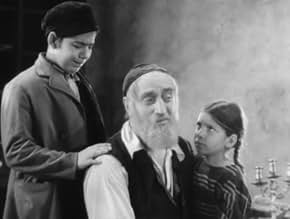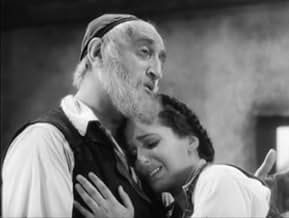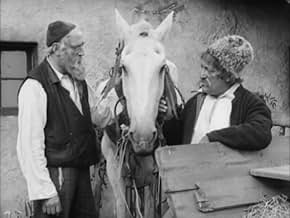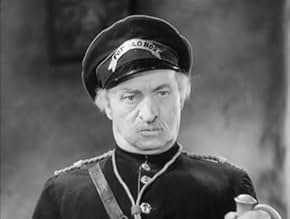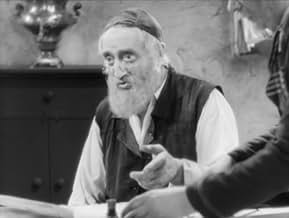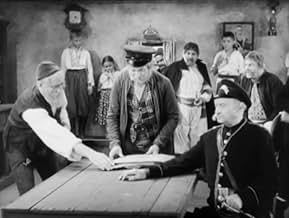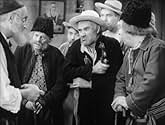Ajouter une intrigue dans votre langueThe original, non-musical film version of the book which inspired "Fiddler on the Roof".The original, non-musical film version of the book which inspired "Fiddler on the Roof".The original, non-musical film version of the book which inspired "Fiddler on the Roof".
- Réalisation
- Scénario
- Casting principal
- Récompenses
- 1 victoire au total
Avis à la une
I had the pleasure of performing as Tevye in a Flagstaff AZ production of Fiddler on the Roof in 1999. I have to say after watching Tevye the Milkman (1939) I was astounded at the story and portrayal of Tevye in this movie. It was not only outstanding but moved me to tears. I was amazed at the events that took place. Some being similar to the musical version but the 1939 version was much more emotional and moving. If you think Fiddler on the Roof (Topal) was great, then you must see this movie. Strip away the music and tell the tale as it was written and you have one of the most outstanding straight plays I have ever seen. A true portrayal of the suffering of the Russian Jews. A big "Thumbs Up".
Much more insightful than fiddler.
If you want to learn more about yiddish / ashkenazic culture, this film is a far better choice than fiddler.
This film also provides a much stronger and fuller character of Tevye.
If you want to learn more about yiddish / ashkenazic culture, this film is a far better choice than fiddler.
This film also provides a much stronger and fuller character of Tevye.
If you watch "Tevya", you might be surprised to learn that it was filmed at the old Biograph Studio in Manhattan...though I suspect that many of the outdoor scenes were filmed in far off Long Island or other New York boroughs, as I cannot imagine that there were places in Manhattan that could double as farm land. It's also surprising because the film is made entirely in Yiddish! It might surprise you to know that many Yiddish films were made in the States for consumption by Jewish audiences around the world.
The story is essentially the same as "Fiddler on the Roof" by Sholom Aleichem... but without the music, singing or expensive sets. It also runs only about 90 minutes...as opposed to double the length for the Hollywood musical.
The story finds Tevya seeing the worst of life, as his youngest daughter defies him to go off to marry a Gentile. Essentially, she is now dead to her family. To make matters worse, her mother soon dies and Tevya and the remaining family members are ordered off the land...the result of yet another Russian pogrom.
The story is not pleasant, but how could you tell the Russian Jewish experience of the 19th century without much sadness and persecution? I see it less as a fun film (it certainly ISN'T), but an important one as it documents a lost way of life...and fits in well with other stories such as "America, America" and "Roots".
Overall, while not pleasant it's very well made and the acting by director/screenwriter Maurice Schwartz is a standout. For those who find "Fiddler on the Roof" overlong and ponderous (I know there aren't many...but I found the film too long and slow), it's a decent alternative.
The story is essentially the same as "Fiddler on the Roof" by Sholom Aleichem... but without the music, singing or expensive sets. It also runs only about 90 minutes...as opposed to double the length for the Hollywood musical.
The story finds Tevya seeing the worst of life, as his youngest daughter defies him to go off to marry a Gentile. Essentially, she is now dead to her family. To make matters worse, her mother soon dies and Tevya and the remaining family members are ordered off the land...the result of yet another Russian pogrom.
The story is not pleasant, but how could you tell the Russian Jewish experience of the 19th century without much sadness and persecution? I see it less as a fun film (it certainly ISN'T), but an important one as it documents a lost way of life...and fits in well with other stories such as "America, America" and "Roots".
Overall, while not pleasant it's very well made and the acting by director/screenwriter Maurice Schwartz is a standout. For those who find "Fiddler on the Roof" overlong and ponderous (I know there aren't many...but I found the film too long and slow), it's a decent alternative.
I noticed this on TV after it started, so I missed the beginning. However, what I saw, which was most of it, moved me greatly.
I grew up in a home where Yiddish was used by my parents when they didn't want the kids to understand. Russian was used when they really didn't want us to understand! Unfortunately my Yiddish is not up to fully understanding the dialogue of the movie, though a meaningful percentage did come through. The titles were OK, and sometimes inadequate.
To compare this to Fiddler is impossible. This is a tragedy and Fiddler is a musical. The acting is very good. It is old-fashioned acting, with large emotions and gesture. The Yiddish, that which I could understand, is a very nice Yiddish. No Americanisms in it, as the Yiddish I heard at home.
One thing that was disturbing was the stereotypical portrayal of the non-Jewish characters. They were portrayed as coarse and mean-spirited. Of course, in a steytl in 19th century Russia, that was probably the norm.
I recommend this film to all. To those who grew up in an immigrant Jewish household, it is a must.
I grew up in a home where Yiddish was used by my parents when they didn't want the kids to understand. Russian was used when they really didn't want us to understand! Unfortunately my Yiddish is not up to fully understanding the dialogue of the movie, though a meaningful percentage did come through. The titles were OK, and sometimes inadequate.
To compare this to Fiddler is impossible. This is a tragedy and Fiddler is a musical. The acting is very good. It is old-fashioned acting, with large emotions and gesture. The Yiddish, that which I could understand, is a very nice Yiddish. No Americanisms in it, as the Yiddish I heard at home.
One thing that was disturbing was the stereotypical portrayal of the non-Jewish characters. They were portrayed as coarse and mean-spirited. Of course, in a steytl in 19th century Russia, that was probably the norm.
I recommend this film to all. To those who grew up in an immigrant Jewish household, it is a must.
10malvernp
Many people believe that 1939 was the greatest year in the history of American cinema. The major film studios were then operating at full throttle. Their creative and technical personnel were also performing at an extraordinarily high level, and there seemed to be no limit to what we thought the movies could then accomplish. This view also applied to the few important non-mainstream movies that were produced that same momentous year. By any objective standard, Maurice Schwartz's film Tevya (also known as Tevya the Milkman) must appear at or near the head of such a list.
And who was Maurice Schwartz? He was the Yiddish-American equivalent of Laurence Olivier and Charles Chaplin---a unique artist who produced, directed, wrote and acted in film. In addition, he founded the Yiddish Art Theatre in New York City, occasionally appeared on the Broadway stage, and even performed character roles in some mainstream Hollywood films toward the end of his career. He died in Israel at the age of 70 while exploring the creation of a Yiddish theater there. And in the opinion of many of us who have viewed this seldom seen classic, Schwartz was the greatest Tevya of them all. Zero Mostel (born in Brooklyn, N. Y. C.) was larger than life, and often seemed over the top as Broadway's original Tevya in Fiddler on the Roof. Topol----(an Israeli) while respectable in the popular movie version of the musical---seemed to lack that intangible element of charisma that was essential to capturing the full spirit of Sholem Aleichem's famous character. Finally, it should be noted that when Fiddler finally went on the road after its initial Broadway run, we were presented with some very fine Tevyas--like Herschel Bernardi and Paul Lipson. However, none of these actors truly captured the simplicity, power, decency and humanity that identified Schwartz's Tevya.
Why does Schwartz stand out as Tevya? There are several important reasons that may explain this result. First, he was born in Czarist Russia in 1890. While he came to America as a young boy, Schwartz actually experienced first hand the stress, pain and humiliation that Jews had to routinely deal with in order to survive in that difficult world. Second, Schwartz was not distracted by the songs, dances and other similar "business" that distinguished his straight dramatic film from Fiddler---the musical. Finally, performing it in Yiddish with an ensemble of similarly trained Yiddish actors also contributed to the authenticity of Schwartz's version.
Modern audiences may consider the acting style of Schwartz' and his players to be somewhat florid and possibly exaggerated--but it was not inaccurate. Some may take issue with how the various Christian characters are presented. But the reality was that Jews existed only as second class "citizens" in Czarist Russia, and daily life there was a constant reminder of who was oppressed, who were the oppressors and why such oppression was taking place.
Fiddler on the Roof has become a major musical drama with such overwhelming universal appeal that it enjoys almost unlimited popularity all over the world. Schwartz's Tevya--with its clarity, warmth and passion---makes that appeal completely understandable. Seek it out and be rewarded with a truly satisfying emotional experience.
And who was Maurice Schwartz? He was the Yiddish-American equivalent of Laurence Olivier and Charles Chaplin---a unique artist who produced, directed, wrote and acted in film. In addition, he founded the Yiddish Art Theatre in New York City, occasionally appeared on the Broadway stage, and even performed character roles in some mainstream Hollywood films toward the end of his career. He died in Israel at the age of 70 while exploring the creation of a Yiddish theater there. And in the opinion of many of us who have viewed this seldom seen classic, Schwartz was the greatest Tevya of them all. Zero Mostel (born in Brooklyn, N. Y. C.) was larger than life, and often seemed over the top as Broadway's original Tevya in Fiddler on the Roof. Topol----(an Israeli) while respectable in the popular movie version of the musical---seemed to lack that intangible element of charisma that was essential to capturing the full spirit of Sholem Aleichem's famous character. Finally, it should be noted that when Fiddler finally went on the road after its initial Broadway run, we were presented with some very fine Tevyas--like Herschel Bernardi and Paul Lipson. However, none of these actors truly captured the simplicity, power, decency and humanity that identified Schwartz's Tevya.
Why does Schwartz stand out as Tevya? There are several important reasons that may explain this result. First, he was born in Czarist Russia in 1890. While he came to America as a young boy, Schwartz actually experienced first hand the stress, pain and humiliation that Jews had to routinely deal with in order to survive in that difficult world. Second, Schwartz was not distracted by the songs, dances and other similar "business" that distinguished his straight dramatic film from Fiddler---the musical. Finally, performing it in Yiddish with an ensemble of similarly trained Yiddish actors also contributed to the authenticity of Schwartz's version.
Modern audiences may consider the acting style of Schwartz' and his players to be somewhat florid and possibly exaggerated--but it was not inaccurate. Some may take issue with how the various Christian characters are presented. But the reality was that Jews existed only as second class "citizens" in Czarist Russia, and daily life there was a constant reminder of who was oppressed, who were the oppressors and why such oppression was taking place.
Fiddler on the Roof has become a major musical drama with such overwhelming universal appeal that it enjoys almost unlimited popularity all over the world. Schwartz's Tevya--with its clarity, warmth and passion---makes that appeal completely understandable. Seek it out and be rewarded with a truly satisfying emotional experience.
Le saviez-vous
- AnecdotesAlthough he isn't credited as an author of the script, the film is a faithful adaptation of the stage play "Tevye the Dairyman," written by Sholem Aleichem himself shortly before his death in 1916. He first offered the play to Jacob P. Adler, one of the great actors of the Yiddish theater, who declined, because there was no romantic leading role. Maurice Schwartz heard about the play, bought the rights from Sholem Aleichem's widow and staged it with himself in the lead role, to great success. Two decades later, he turned it into this film. The script is substantially as written by Sholem Aleichem, despite the introduction of characters and elements not contained in his original short stories.
- GaffesTowards the end of the film, Tevye says his daughter's plea, "My people are your people," is from the Book of Ecclesiastes. It's actually from the Book of Ruth.
- Citations
Chavah 'Khave': Why are there these differences between people, between beliefs?
Fedya 'Fedye' Galagen: Wicked people created these differences. But we should keep ourselves above all beliefs. Because you are my belief.
- ConnexionsFeatured in Almonds and Raisins (1984)
Meilleurs choix
Connectez-vous pour évaluer et suivre la liste de favoris afin de recevoir des recommandations personnalisées
Détails
Box-office
- Budget
- 70 000 $US (estimé)
- Durée1 heure 33 minutes
- Couleur
- Rapport de forme
- 1.37 : 1
Contribuer à cette page
Suggérer une modification ou ajouter du contenu manquant

Lacune principale
By what name was Tevye le laitier (1939) officially released in India in English?
Répondre
